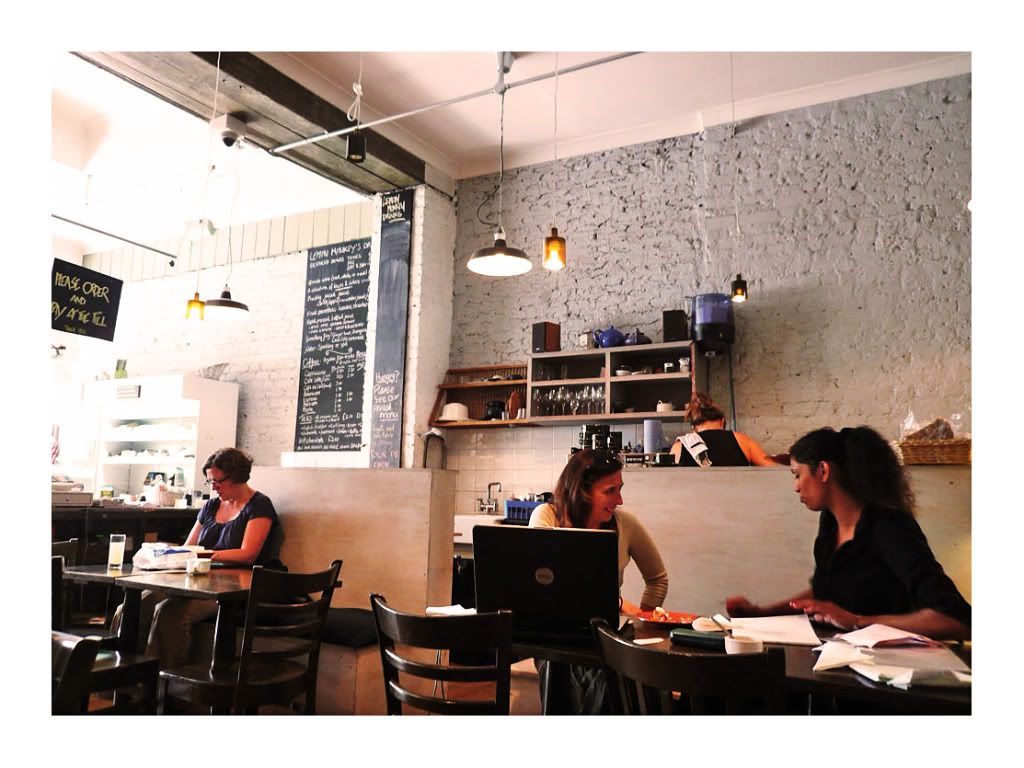
Lemon Monkey is a delicatessen on the concrete shores of Stoke Newington High Street. It can be found at the junction with Church Street, not very far from that other favourite haunt of mine, the 'Stoke Newington Book Shop'. As an establishment serving quality fair it seems Lemon Monkey is a little incongruent amongst its less esteemed neighbours. There is a KFC a few doors to the right and a Kurdish greengrocers to the left. Not too far away next to a cashpoint a tramp sits shiftily beneath one of the doorsteps. But he is a gentle tramp and ever since reading Orwell's 'Down and out in Paris and London' my feelings for the tramp have softened somewhat. But this article is not about tramps. It is about Lemon Monkey.
I love coming here to invigorate and recharge my creative batteries on delicious coffee and pastries. The walls inside are packed with quality foods from the continent (which you can also buy). Pastas from Italy, olives from Sicily, sardines, jams, quinces, wines, biscuits, exotic chocolates and coffees and teas amidst much else besides. Foodstuffs from all over the world stand in soldierly rows. The decor is rustic and it has something of the Edwardian about it. If you forget to bring a book you can always stare at the walls or read the labels. The clientele it must be said are not a mixed bunch. When contrasted with the denizens of Stokey as they shuffle pass the large street window, they seem positively hand selected. They're more likely to be Guardian newspaper readers and foppish types in here.
I love coming here for a spot of reading on my days off. The coffee served is from the veritable Monmouth Coffee Co. (which every coffee connoisseur knows is one of the finest coffee houses in London). The sandwiches are delicious and stuffed with continental chorizo, prosciutto, and bries. The pistachio pie is sublime; not as sweet as the others, and the lemon provencal is simply zinging. The music piped through the speakers is not too loud so as to interfere with the serious business of reading and thinking. Only the other day I was seated there and a most brilliant thought visited me. Luckily I caught it before it flew off again, for if I hadn't been on the look out for it, it may have landed on another perch.
I'm currently plodding through 'A life of Montaigne' by Sarah Bakewell and 'Torquemada - and the Spanish Inquisition' by Rafael Sabatini. Montaigne (Michel de Montaigne (1533-92)) wrote his famous 'essays' in the 1580s. These bite sized pondering's of a nobleman are like modern blog entries. He writes about himself. He writes about what he see's. What he feels. He casts his gaze inwards letting it fold and refold itself within him. As if he is kneading the dough of his internals. He's never certain. Always adding a qualification 'but I don't know' at the end of his sentences. He lets his writing meander, and it does, and it takes him to wonderful places in thought space. Montaigne was the first blogger in the world. He advocated moderation in everything and encouraged introspection. He also said that everyone should 'keep a room at the back of the shop' - by this he meant everyone should have a place to retire to now and again. A place away from everything where one can be oneself and where one will not be disturbed. Montaigne lived in a castle in Bordeaux and he himself 'kept a little room for himself' in one of the castle turrets. The turret is round so the room was circular and it had a little window which looked out onto the family estate. One of the walls was covered with about a thousand volumes of books Montaigne had inherited from his father and his friend La Boetie. There were tomes from Greek antiquity to contemporary literature. Montaigne would retire to his little room of contemplation whenever he needed escape from life, his wife, family, children, and the demands of running an estate. He'd come in, take a book off the shelf, seat himself comfortably and pour over the wisdom of the ancients. He read Plutarch, Cicero and Seneca. He read Marcus Aurelius, Plato and Socrates. He read everything. For the age in which he lived; an age of Witch burnings, Catholic-Protestant internecine conflict, the rape of the New World, the auto de fas of the Spanish Inquisition, the intolerance, the talk of 'end of days' - his mind and his 'little room at the back of the shop' was a sanctuary. In fact it was a time warp. The future.
I love the idea of the little room behind the shop as a metaphor for how to order one's life. There are a lot of wise men in the world. They are mainly Greek or French and unfortunately, they're all dead!
Oh well, they live on in their hallowed written pages. In their witty aphorisms and mild mannered admonishments. Which I, now hundreds of years later, keep securely fastened to my chest - like butterflies in a box - lest they escape.
____________